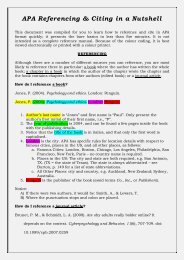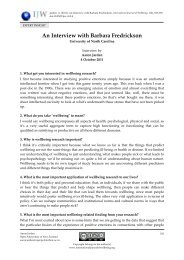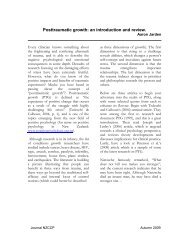The expert therapist - Aaron Jarden
The expert therapist - Aaron Jarden
The expert therapist - Aaron Jarden
You also want an ePaper? Increase the reach of your titles
YUMPU automatically turns print PDFs into web optimized ePapers that Google loves.
position, assuming a rather beneficent and non-maleficent role, which<br />
established their <strong>expert</strong> status.<br />
However, this educative role did not always entail beneficial<br />
consequences. For example, there were no instances where the clients asked<br />
for clarification or questioned the <strong>therapist</strong>s. In contrast, there were countless<br />
instances where the <strong>therapist</strong>s asked for clarification or questioned their<br />
clients, for example:<br />
<strong>The</strong>rapist: You feel much better now, okay, now I want to ask you,<br />
how do you explain that? A few minutes ago you were having these<br />
very intense uncomfortable sensations now you feel better!<br />
Client: I guess when I am writing I now feeling less anxious.<br />
Here the direct questioning resulted in the client becoming less sure of<br />
herself, in contrast to previous dialogue. Nonetheless, despite the occasional<br />
detrimental effect, the educative role aided in warranting the <strong>therapist</strong>s‟ <strong>expert</strong><br />
status.<br />
Going to Extremes.<br />
A second discursive strategy involved the regular use of „extreme case<br />
formulations‟ (Pomerantz, 1986). Extreme case formulations involve taking a<br />
position being advocated to its extreme in order to help make that position<br />
more persuasive (Coyle, 1995; Gergen, 1989). In the <strong>therapist</strong>s case, this<br />
included the use of terms such as „always‟, „never‟, „nobody‟, „really‟,<br />
„extremely‟ and „everyone‟. Examples of the use of these terms can be seen in<br />
the following extracts:<br />
<strong>The</strong>rapist: …but it’s an extremely deeply held belief, is that, every<br />
time that he starts to feel that way, to feel worthless…<br />
<strong>The</strong>rapist: NOW at this particular time, do you really believe that at<br />
this time in your life, you’re just a push=over and weakling, like you<br />
were when you were a kid, are you a mammas’ baby or not?<br />
<strong>The</strong>rapist: I always get them to look at their beliefs…<br />
<strong>The</strong> function of this terminology was to make the positions the <strong>therapist</strong>s<br />
were advocating more convincing. This increased the strength of their<br />
accounts, ensured that their versions prevailed, and in turn helped warrant<br />
their <strong>expert</strong> status. However, at times it also seemed that some of these<br />
formulations pushed the “horizon of the intelligible” (Wetherell, 1999, p. 268).<br />
For example, this was demonstrated by the client‟s body language, such as<br />
the raising of eyebrows or squinting, and posed a direct threat to the<br />
<strong>therapist</strong>‟s <strong>expert</strong> status.<br />
Concealment.<br />
A third discursive strategy involved <strong>therapist</strong>s concealing their own<br />
personal views and knowledge in order to reinforce their <strong>expert</strong> status. In this<br />
case, what was not said turned out to be just as important as what was said.<br />
5





